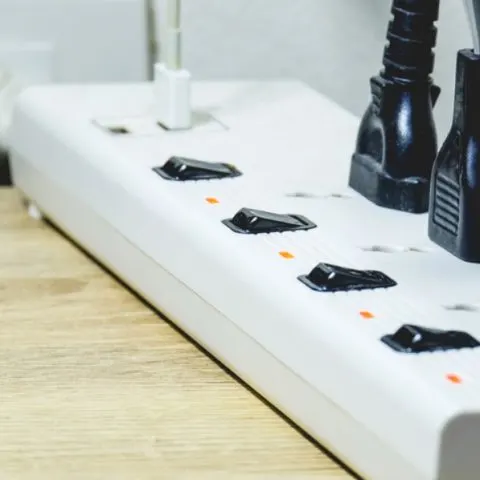A surge protector is crucial to protect your appliances from sudden power surges. Your devices must get a consistent power supply. Inconsistency in power can extensively damage your appliances and result in expensive repairs.
Surge protectors also make maintenance of your electrical circuits easier and help reduce the cost of repairing machines. Buying a high-quality surge protector can go a long way in protecting your appliances and saving you money.
What is a surge protector?
A surge protector is a unique device that shields your electrical appliances from electrical spikes in alternating current circuits. Surges last a short time and can be up to 1000 volts. A surge protector is usually triggered when the spike is 3 or 4 times the voltage in your power mains.
When activated, the protector diverts the extra power to earth or absorbs it and releases it as heat. That ensures the extra power does not get into your appliances and damage them.
How does a surge protector work?
As mentioned above, a surge protector redirects power spikes away from your appliances and ensures that they are not damaged. Surge protectors contain Metal Oxide Varistor (MOV), which works like a pressure-sensitive valve.
Check this too: 3 Way Switch How to & Troubleshooting Guide
The MOV reduces resistance when it detects high voltages and increases it when voltages are low. In addition, it automatically engages when there are current spikes in your circuits and diverts excess power.
A MOV has three parts, including the metal oxide and two semiconductors that connect the metal oxide to your power supply and grounding line.
These semiconductors have varying resistance, which ensures that they change their resistance when power is too low or too high.
It is essential to mention that surge protectors provide varying levels of protection for your appliances. That is measured using joules, and you will notice a joule rating on the surge protector. The joule rating tells you how much energy your protector can absorb before it stops working.
Therefore, the higher the rating on your surge protector, the better the protection it will provide to your appliances.
What does a surge protector do during a power outage?
It is essential to have a surge protector in place during a power outage. Surge protectors will protect your equipment from power spikes when the power comes back on. It is not advisable to unplug your surge protector during an outage.
Make sure that you regularly inspect your protector, especially if you live in an area with frequent power blackouts or brownouts. If you notice that it is not working anymore, replace it immediately.
What equipment needs surge protectors?
You may be wondering whether you have equipment in your home that requires a surge protector. When making the decision, a rule of thumb is that you should buy surge protectors for appliances that are expensive to replace or repair.
Also, remember that the latest electrical devices are more sensitive to power surges than older ones.
For example, a fridge made in 2020 would be more sensitive to power surges than an older one from the 1990s. That is because new appliances have smaller and more delicate components.
Microprocessors, for instance, are very sensitive to high voltages and will only work correctly if the current is stable and of the proper voltage. Here are some of the equipment in your home and office that require surge protectors.
- Televisions
- Computers
- Microwaves
- Video gaming systems like Playstation, Xbox and Nintendo Switch
- High-end audio equipment like soundbars and AV receivers
Who needs surge protectors?
Surge protectors are necessary for both homes and offices, as long as you use electrical appliances. That means anyone who has electrical appliances should buy and use surge protectors. Remember that you will not notice damage due to power surges until your devices stop working suddenly.
That can be inconvenient and costly. Here are some critical considerations to make when buying surge protectors.
- The appliances you want to protect.
- Think about the number of outlets you have in your home.
- Check the UL seal, which tells you that the surge protector is certified by Underwriter’s Laboratories.
- Make sure that the surge protector you buy is a transient voltage surge protector.
- Make sure that it has a warranty.
- Check that it has an indicator light.
FAQs about surge protectors
Do surge protectors do anything?
Surge protectors are specially constructed with a metal oxide varistor that diverts excess current to protect your appliances. They shield your devices from both low and high-voltage variations and ensure they serve you for a long time.
Surge protectors also help save you money that you would have spent on repairing or replacing your appliances.
Do you still need surge protectors?
If you have replaced your appliances with new modern ones, you should ensure that you continue using surge protectors. Smaller components used in current devices are easily damaged during power spikes and can be very expensive to repair.
What should you not plug into a surge protector?
Do not plug high-capacity devices into your surge protector. That is because they draw a lot of power, and using a protector is likely to cause problems in your system. Here is a list of devices you should not plug into a surge protector.
- Toaster
- Crockpot
- Skillet
- Space heaters
- Dehumidifiers
Check this too: LG Sound Bar How to & Troubleshooting Guide
Do surge protectors prevent fires?
Surge protectors can prevent fires. In a power surge, your electrical devices may spark and catch fire. Using a surge protector will divert the excess power, preventing sparking and an electrical fire. That said, it is essential to take other precautions to prevent electrical fires.
These include regularly inspecting wiring, replacing worn-out wiring and power cords, repairing damaged appliances, and not overloading your outlets.

